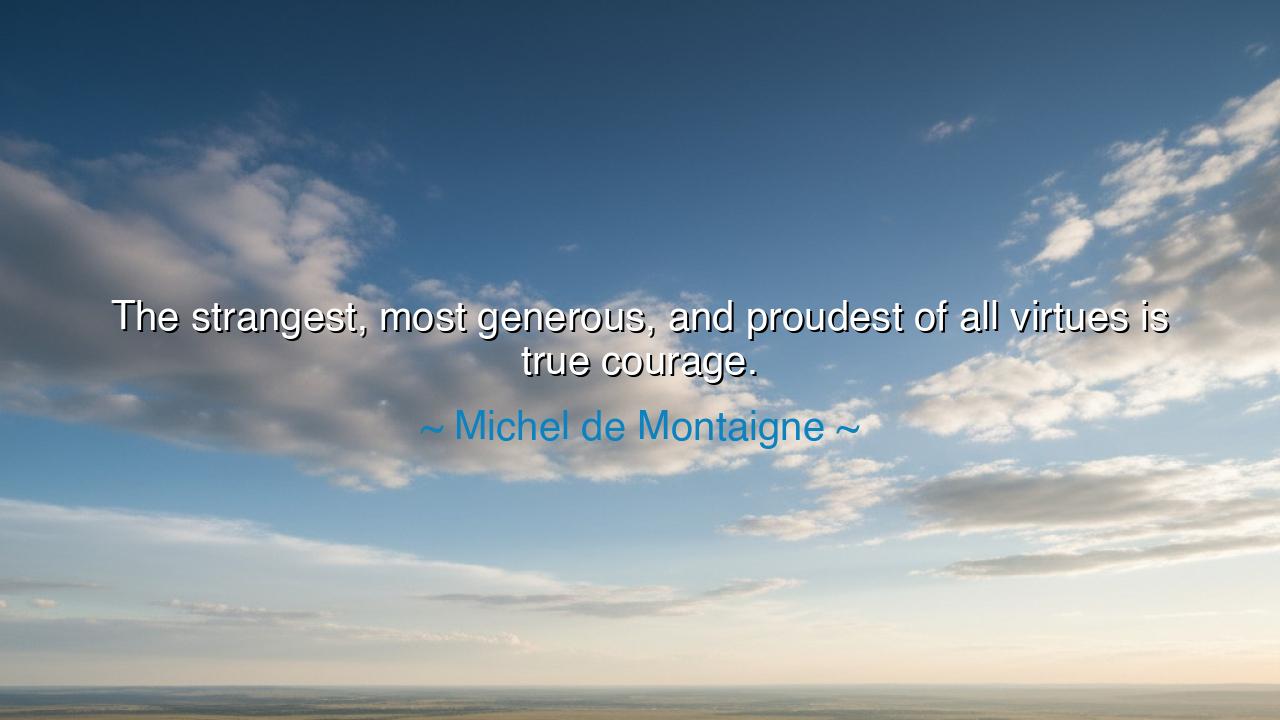
The strangest, most generous, and proudest of all virtues is true






The philosopher Michel de Montaigne, that wise voice of the Renaissance who looked deeply into the mirror of human nature, once declared: “The strangest, most generous, and proudest of all virtues is true courage.” Few sentences capture the essence of the human spirit so precisely, for in these words Montaigne reveals that courage is not merely a weapon for battle or a shield against fear—it is the highest expression of the soul’s nobility. He calls it strange because it defies the instinct of self-preservation; generous because it gives itself wholly for others or for truth; and proud because it stands tall even when all else has fallen.
To understand Montaigne’s wisdom, we must remember that he lived in an age torn by war, disease, and political upheaval—a time when men’s hearts were tested not by comfort, but by calamity. In his essays, he searched for what makes a life truly virtuous amid such chaos. And he found that all other virtues—prudence, temperance, justice—depend on courage to live them out. For what good is justice without the courage to speak it? What worth is love without the courage to defend it? What meaning has faith if one trembles to stand for it? Thus, courage is the root from which all other virtues draw their strength. It is the fire that animates the good.
Montaigne called courage strange because it runs against the grain of nature. To risk one’s life, one’s comfort, or one’s peace for an ideal is an act contrary to the instinct of survival. The coward obeys the body’s law—protect yourself, hide from pain, preserve comfort. But the courageous obey the spirit’s law—stand for what is right, though it may cost you everything. And this is strange indeed, for it is an act of rebellion against the self, a defiance of mortality. When a person chooses conviction over safety, they step into the realm of the divine, for they act not as a creature of flesh, but as a being of principle.
But courage is also generous, Montaigne reminds us, because it gives of itself without demand for return. It is the virtue of those who offer their strength for the sake of others—the soldier who shields his comrade, the healer who enters the plague-stricken city, the mother who faces hardship to feed her child. True courage is never selfish; it does not seek glory or applause. It gives because giving is right, because love and duty command it. It is generosity at its purest form—the giving of one’s very being. And that is why Montaigne, in his deep humanity, saw courage as the most selfless of virtues.
And finally, he called courage proud, for it cannot bow to despair. It does not mean arrogance or vanity—it is the noble pride of the spirit that refuses to surrender to fear or humiliation. The courageous man stands upright even in defeat, because his dignity comes not from success, but from steadfastness. Consider the story of Socrates, who, condemned to death for speaking truth, could have saved himself by recanting his words. Yet he chose to drink the hemlock calmly, saying that death was not to be feared when one’s conscience was at peace. That act was not the pride of ego—it was the pride of integrity, the proud calm of one who knows that his soul cannot be broken, even if his body is destroyed.
In history’s pages, true courage takes many forms—not only the roar of warriors but the quiet endurance of the gentle. Think of Mahatma Gandhi, who faced an empire not with sword or gun, but with the moral power of nonviolence. He called upon his people to face beatings, imprisonment, and death without hatred. His courage was strange, for it sought victory through peace; generous, for it was rooted in compassion for both oppressor and oppressed; and proud, for it refused to bow before injustice. Through such souls, Montaigne’s words come alive, proving that courage is not confined to battlefield or throne—it lives wherever the spirit of truth stands unshaken.
And now, my children of thought, take this wisdom to heart: true courage is not the absence of fear, but the mastery of it. It is the quiet decision to act rightly, even when trembling. It is the refusal to betray one’s values for comfort or gain. When you are tempted to shrink from the storm, remember that the strangest virtue—the one that asks you to give when it hurts, to rise when it is easier to kneel—is also the one that grants the deepest peace. Courage does not promise safety; it promises meaning.
So, live as Montaigne would have you live: with hearts open, spines straight, and spirits generous. When the time comes—and it always does—when you must choose between safety and truth, choose true courage, for it alone will make you free. It will make you, in the words of the ancients, not merely alive, but alive in honor. For of all the virtues known to man, courage is the only one that makes us worthy of our own humanity.






AAdministratorAdministrator
Welcome, honored guests. Please leave a comment, we will respond soon